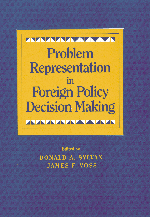Book contents
- Frontmatter
- Contents
- List of Contributors
- Part I Introducing Problem Representation
- Part II Overarching Conceptual Issues
- Part III Empirical Analysis
- 7 Problem Representations and Political Expertise: Evidence from “Think Aloud” Protocols of South African Elite
- 8 Reasoning and Problem Representation in Foreign Policy: Groups, Individuals, and Stories
- 9 Representing Problem Representation
- 10 A Problem-Solving Perspective on Decision-Making Processes and Political Strategies in Committees: The Case of Controversial Supreme Court Justice Nomination Hearings
- 11 When Gender Goes to Combat: The Impact of Representations in Collective Decision Making
- 12 Representations of the Gulf Crisis as Derived from the U.S. Senate Debate
- 13 Configuring Issue Areas: Belgian and Dutch Representations of the Role of Foreign Assistance in Foreign Policy
- Part IV Conclusion
- Index
8 - Reasoning and Problem Representation in Foreign Policy: Groups, Individuals, and Stories
from Part III - Empirical Analysis
Published online by Cambridge University Press: 12 October 2018
- Frontmatter
- Contents
- List of Contributors
- Part I Introducing Problem Representation
- Part II Overarching Conceptual Issues
- Part III Empirical Analysis
- 7 Problem Representations and Political Expertise: Evidence from “Think Aloud” Protocols of South African Elite
- 8 Reasoning and Problem Representation in Foreign Policy: Groups, Individuals, and Stories
- 9 Representing Problem Representation
- 10 A Problem-Solving Perspective on Decision-Making Processes and Political Strategies in Committees: The Case of Controversial Supreme Court Justice Nomination Hearings
- 11 When Gender Goes to Combat: The Impact of Representations in Collective Decision Making
- 12 Representations of the Gulf Crisis as Derived from the U.S. Senate Debate
- 13 Configuring Issue Areas: Belgian and Dutch Representations of the Role of Foreign Assistance in Foreign Policy
- Part IV Conclusion
- Index
Summary
Introduction
Since the early 1960s, the results of work on intragroup dynamics (e.g., Stoner 1968; Wallach, Kogan, and Bern 1962) have consistently demonstrated that decision making in a group context does not result in an aggregation of individual group members’ preferences (see Beasley, this volume), nor does it provide assurance that there will be superior decisional outcomes over such an aggregation (Levine 1989; Levine and Moreland 1987; Maass, West, and Cialdini 1987; Mullen 1987; Stasser 1992; Stasser, Kerr, and Davis 1989). How is it that a group context mediates individual cognition, and how does this mediation make a difference in foreign policy decision making?
A significant number of foreign policy decisions are made in a group environment. Even where a single actor will make the final decision, he or she often will solicit the advice of an ad hoc committee of experts or other interested persons. For instance, during the Gulf crisis during the Bush administration, James Baker assembled a group of academics and State Department representatives under the leadership of Dennis Ross to provide the president with strategy options. Similarly, during the Cuban missile crisis, President Kennedy charged ExComm with the task of generating alternative responses to the confirmation of the presence of Soviet offensive missiles in Cuba.
In these and many other decision-making events, collective decision making has been pivotal in the final decision. Of particular interest, however, is that seldom have the decisions exactly reflected a single individual's preferences.
Some of the more prominent explanations for deficient group decision making focus on a breakdown in collective information acquisition, exchange, and processing (Stasser 1992; Stasser et al. 1989). Among these, for instance, intragroup attitude polarization was the subject of research by Burnstein and his associates in the early 1970s, leading to the Persuasive Arguments Theory (see also Mackie 1986; Turner 1987). Similarly, certain group environments may mediate individual cognition when a common “mode of thinking” emerges through group pressures to conform (Janis 1972, 1982; Vertzberger 1990). Other variables in the process of decision making in a group context that alter otherwise individual cognition have to do with the cohesiveness of intragroup minority subcultures (Moscovici 1976; Nemeth 1987), risk management (Dion, Baron, and Miller 1978; Vertzberger 1994), leaders’ management of options and information (Hermann 1987), and so forth.
- Type
- Chapter
- Information
- Problem Representation in Foreign Policy Decision-Making , pp. 187 - 212Publisher: Cambridge University PressPrint publication year: 1998
- 7
- Cited by



